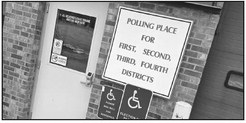Let local government decide spending priorities
Local officials must look to local priorities and needs rather than Madison mandates when determining budget priorities as they relate to law enforcement, roads, parks and other spending areas.
In an argument of quantity over quality, Sen. Van Wanggaard of Racine wants municipalities to be punished with loss of state aid if local elected officials reduce law enforcement budgets. The proposal includes exceptions for municipalities that merge law enforcement services with other municipalities.
The measure is part of a law enforcement package the Republican lawmaker is introducing to counter proposals from Gov. Tony Evers calling for law enforcement reform, especially with the use of force. Evers, a Democrat, has ordered a special session of the legislature to consider the reform package.
Wanggaard, a former police officer, is strongly opposed to calls to defund police departments. Those calls grew in national momentum following the killing of George Floyd in Minnesota last spring and other police-related shootings around the country.
As often happens when a highly-nuanced issue is reduced to bumper-sticker level talking points, the debate over law enforcement resources has an overabundance of yard sign slogans without much in the way of economic realities, pragmatism or fiscal responsibility.
According to the nonpartisan Wisconsin Policy Forum, about one out of every five dollars spent by local governments in the state is spent on law enforcement. In 2018, municipal law enforcement spending statewide topped $1.28 billion. When adjusted for inflation, this amounts to about a 30% increase over what was spent in the 1980s.
While former Gov. Scott Walker’s Act 10 legislation effectively gutted the power of public employee unions, it specifically exempted law enforcement unions which have only grown in power in the past decade.
With local governments strapped for money due to increasing costs and stagnating revenues, police budgets should be considered along with all budget areas when cuts have to be made. These cuts may be a matter of delaying the replacement of squad cars by a year, making changes to health insurance to save money on premiums, or even renegotiating the cellphone or copier contracts. While all of these could save money in a tight budget, none of them will have a major impact on the quality of law enforcement in a community.
Waangard’s proposal would set law enforcement as a spending priority regardless of the needs of the local community while doing nothing to limit the power of the law enforcement unions to negotiate wage and benefit increases far in excess of non-law enforcement public employees. This sort of Madison math only works to secure union endorsements for future political aspirations at the expense of local taxpayers.
Local elected officials, working with local chiefs, are best able to determine the law enforcement needs of their constituents. It is time to end meddlesome Madison mandates and let locals spend their tax dollars where they are needed most.




